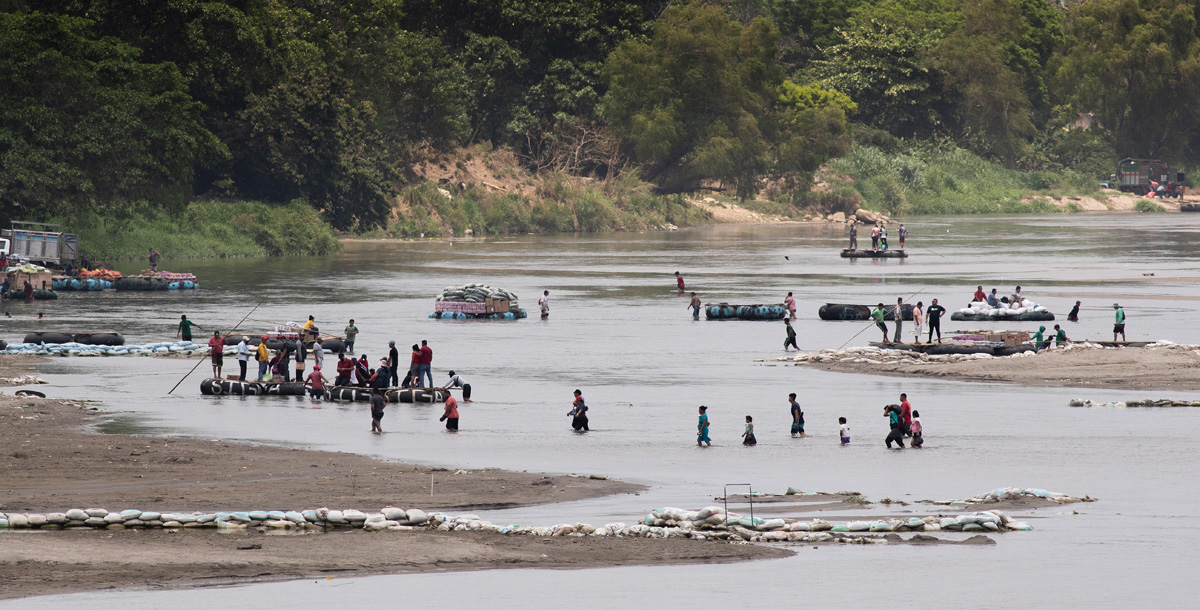Key points:
• A group of leaders from the Methodist Church of Mexico and The United Methodist Church traveled to southern Mexico in April to meet with groups working with immigrants crossing into the country.
• Though there is no Methodist presence in southern Mexico, the leaders are seeking ways to partner with other denominations and organizations in the area.
• Many of those same migrants will eventually find their way to northern Mexico or the U.S., where Methodist and United Methodist churches have ministries to help them.
A group of leaders from the Methodist Church of Mexico and The United Methodist Church traveled to southern Mexico April 16-23 to meet with groups working with immigrants crossing the country’s southern border.
Though there is no Methodist presence in southern Mexico, the leaders are seeking ways to partner with other denominations and organizations in the area.
Tens of thousands of migrants from different countries entered Mexico through its southern border last year. Mexico’s Commission for Refugee Assistance reported that more than 100,000 asylum applications had been submitted in 2021 — the highest figure yet reported and more than twice the number submitted in 2020. That doesn’t take into account the numbers who enter without declaring asylum.
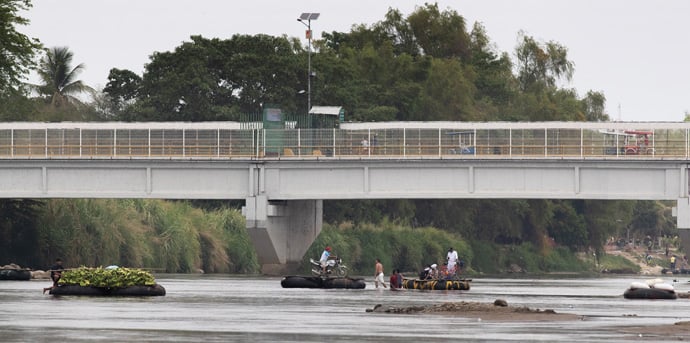
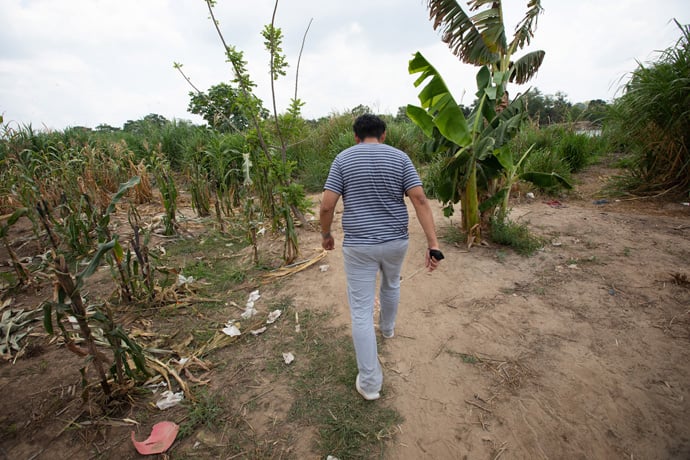
Many of those same migrants will eventually find their way to northern Mexico or the U.S., where Methodist and United Methodist churches have ministries to help them.
“We would like for churches to work together to make the walk of the migrants as easy as possible, and pastoral support is so important,” said Bishop Raquel Balbuena Osorio of the Methodist Church of Mexico.
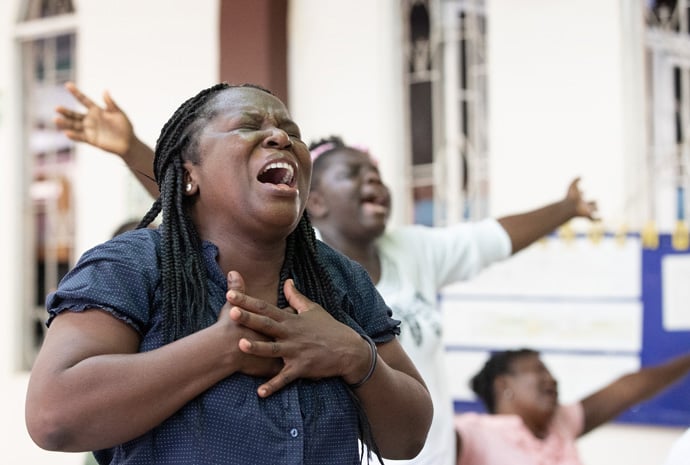
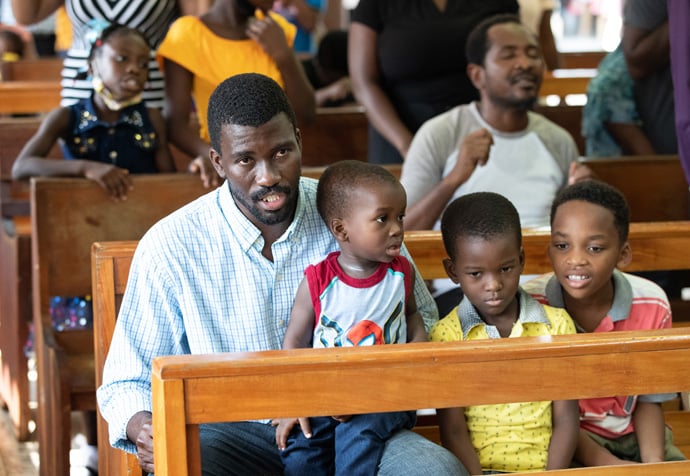
The Methodist group’s trip began in Tapachula, near Mexico’s border with Guatemala — the route for a number of nationalities traveling through Central America. The team attended Easter Sunday services at Seventh Baptist Church and Second Church of the Nazarene. Both churches have formed faith communities with Haitian immigrants and host services in French and Creole.
Pastor María Marroquín of Second Church of the Nazarene said she doesn’t have enough words to express what the Haitian ministry has meant to her.
“Seeing the state of need in which they come, the difficulties and limitations that they live with here, but you can see them in the temple on Sundays, with overflowing joy and gratitude for what they have received,” she said. “They fill us with a lot of hope.”
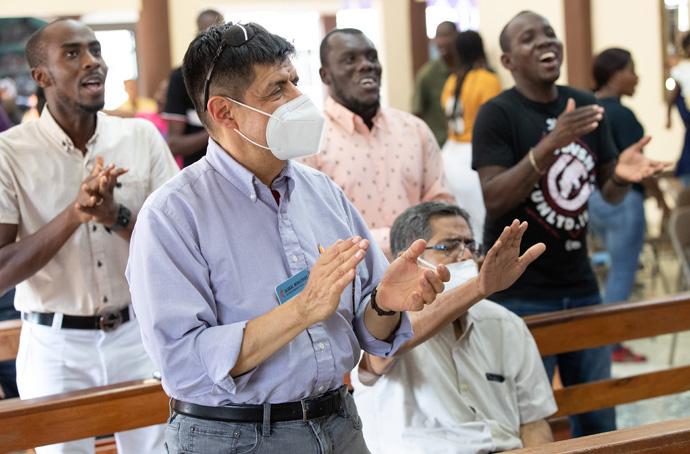
They visited several shelters and institutions that provide support to migrant families in the south and center of the country, including the Catholic-run Bethlehem Diocesan shelter.
Father Cesar Augusto Cañaveral Pérez, the shelter’s general director, said that he welcomes the opportunity to partner with The Methodist Church.
“When we work together, you don’t talk about religious difference; we all work together for the same objective,” Pérez said. “We are fulfilling some of the commands of the gospel: to give food to the hungry and accept the foreigner.”
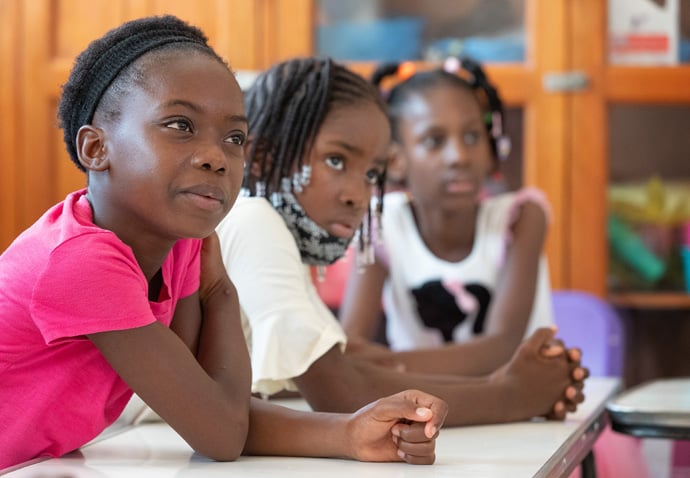
Claudia Berenice Cruz Mérida, director of Immigration and International Policy for the Tapachula City Council, told the group that her city — which she calls “the gateway to migration” — also welcomes potential partnerships with the church to promote safe, orderly and regular migration.
“The churches have … donated and provided food,” she said. “They have opened their temples; they have welcomed migrants in their own homes; they have helped them in the process of social integration.”
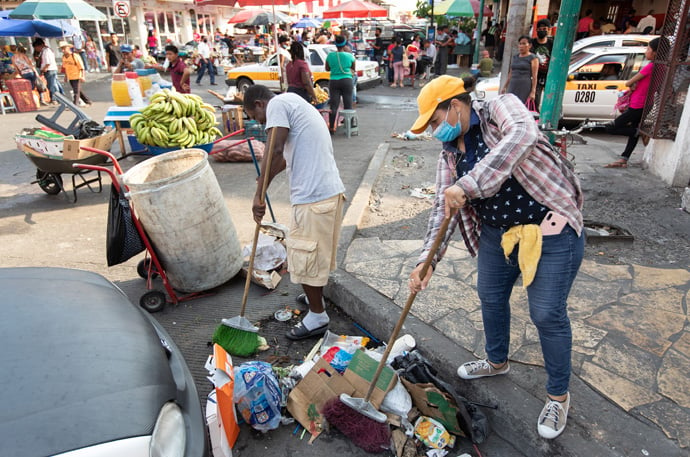
The city’s government offers a work program for migrants that provides them a stipend in exchange for working as street cleaners.
Leticia, a migrant from Honduras, said the stipend is enough to pay for shelter, but she still struggles for enough money for food. She’s looking for better economic opportunities and more stability than she was afforded in her home country, and said she will go anywhere she can live “a better life.”
“Honduras is a beautiful country but we have gangs and violence,” she said. “It’s very difficult to even have a business; the gangs would extort you for money.”
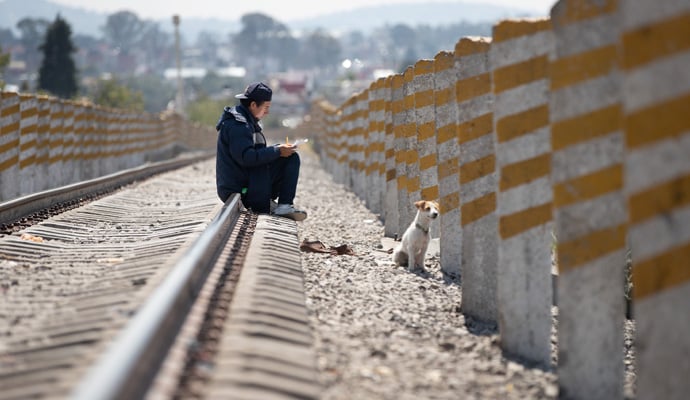
About 600 miles northwest in the area around Puebla, the team observed shelters that tend more to the immediate needs of migrants who are on the move rather than looking for long-term facilities.
Casa de la Sagrada Familia, a shelter in Apizaco, sits next to railroad tracks where freight trains run several times a day. Hopping the trains is a popular but dangerous means of travel for migrants, who have bestowed them with an ominous nickname: “La Bestia,” or “The Beast.”


Sergio Luna, the shelter’s director, said that migrants following the train route likely don’t have money for other means of travel and are only looking for somewhere to rest a while, perhaps a meal and a shower or first aid.
“I consider our work to be humanitarian aid,” he said. “The flux of people is constant and this route is very dangerous. They suffer physical aggressions, kidnappings and extortion.”
Nearby in Tlaltelulco, the team met with a family who took it upon themselves to help migrants riding the trains that run by their house.
Learn more

Virginia George-George, a member of El Divino Salvador Methodist Church in Tlaxcala, began offering food, clothes and shoes to those who would briefly stop for a rest before hopping back on the train, and later opened rooms in her house for them to sleep. Her family also collects contact information to reach out to the migrants’ families and let them know how they are doing.
Another member of the family, Pastor David Castro Fernández, said that his son had migrated to the U.S. and told him about help he received on the difficult journey.
“If I help these people, I believe God is going to bless my son,” he said.
George-George said her family’s ministry of hospitality came about unexpectedly.
“We never imagined we would be doing this, ever,” she said. “Once you have the contact with the migrants, you just want to pray for them and we -ask God to protect them.”
The trip concluded with a visit to the Oasis en el Medio del Camino migrant shelter in Apaxco, operated by the Methodist Church of Mexico with support from the United Methodist Committee on Relief. The shelter offers food, sanitation facilities and a safe place to rest for migrants on their way north through Mexico.
Dagoberto, a 29-year-old migrant from Honduras, said he is trying to reach the U.S. to find better-paying jobs to help support his parents and his two children back home.
“I don’t want to leave; the economic situation forced me to leave,” he said.
Migration isn’t easy, he added, describing how much his feet hurt from constant walking, a lack of sleep and having to beg for money for food or water.
“There are moments I have felt so discouraged that I’ve wanted to give up and turn myself in for deportation, but God has been telling me to continue because he will be with me. When I need him the most, he’ll be there.”


Darwin, also from Honduras, described recently being kidnapped in Mexico. He was being held with nine other captives, but his family didn’t have the money to pay his ransom.
“I thought I wasn’t going to survive. I prayed to God to take these people away from me and finally they let me go,” he said. “With this second chance, my dream is to go to the U.S. to get a better life.”

Bishop Felipe Ruiz Aguilar of the Methodist Church of Mexico prayed with the group of migrants at the shelter and blessed them on their journey. Aguilar, who is returning to the local church in August after his second term as bishop ends (bishops in the Mexican church are term-limited), plans to work full time in immigrant ministry.
“The migrants deserve our consideration because they are worthy of having a dignified life,” he said.


The Rev. Joel Hortiales, director of Hispanic/Latino ministries and border concerns for the California-Pacific Conference, said, “The immigrant is a person, not a number. You feed them and treat them like a person.”
Hortiales described the trip as an educational one that highlighted the complexities of immigration and pointed out that migration “is not from Mexico only, not to the U.S. only, but is worldwide.”

The Rev. Toña Rios, a pastor at Baldwin Park United Methodist Church in Baldwin Park, California, and a native of El Salvador, said visiting with migrants in the shelters was “heartbreaking” for her.
“When I see them, I see me. I have seen their struggles to find housing and food,” she said. “I want my brothers and sisters from the U.S. to understand at least 1% of the reality we live when we come from the other side of the border.”


The Rev. Uzi Castañeda Morales, pastor of El Divino Salvador Methodist Church in Tlaxcala, Mexico, said he felt conflicted about the trip.
“I am happy because there is a vision but it hurts to see the situation of violence that children and families go through,” he said. “Why do we have to help those families to be safe here; why not help them to have a good life where they come from?”
Leaders from the Methodist Church in Mexico have continued dialogue with the shelters they visited, and those shelters have begun informing migrants about available support through the Methodist Church. Bishop Ruiz, who oversees the Northwest Conference in Tijuana, shared that a family of five recently arrived for the feeding program in Tijuana because they received information from a shelter in Tapachula. Another mother and her children also arrived in Tijuana from Tapachula and are being helped to find work and school placement.

Butler is a multimedia producer/editor and DuBose is staff photographer for United Methodist News. The Rev. Gustavo Vasquez, director of United Methodist News for the Hispanic-Latino audience, contributed to this report. Contact them at (615) 742-5470 or [email protected]. To read more United Methodist news, subscribe to the free Daily or Weekly Digests.

